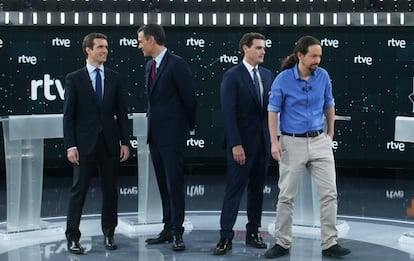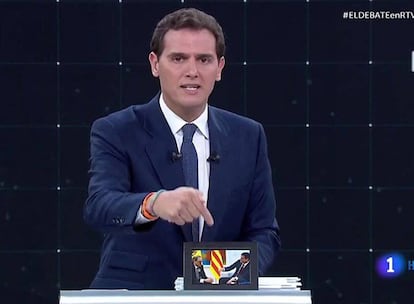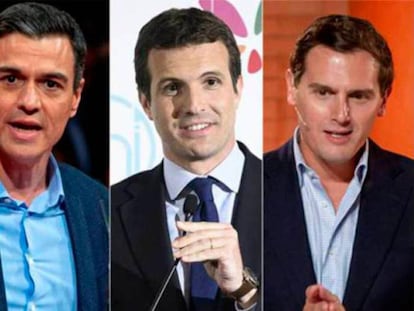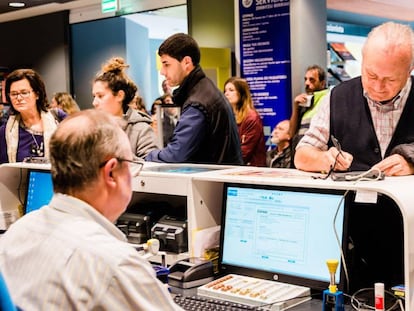Spanish politicians clash over Catalonia in first televised debate
The Monday night event revealed the deep divide between the left-wing and right-wing blocs ahead of the general election on April 28

The televised debate between candidates running in Sunday’s general election in Spain has consolidated the deep division between two opposing blocs with irreconcilable positions on thorny matters such as Catalonia.
The event, which was aired live on Monday night on the state broadcaster TVE, featured the leaders of the country’s four main political groups: the governing Socialist Party (PSOE), the conservative Popular Party (PP), the center-right Ciudadanos (Citizens) and the leftist alliance Unidas Podemos.
There was one notable absence: Vox, the far-right party that burst onto the political scene at the Andalusian regional elections in December, and which could pick up around 10% of the vote on Sunday according to the polls. Prime Minister Pedro Sánchez of the PSOE had originally agreed to a five-way debate including Vox leader Santiago Abascal, but election authorities blocked this, citing legislation on minimum congressional representation. Vox currently has no deputies in Spain’s Congress.
Polls are predicting another fragmented scenario in which alliances will be necessary for a majority
The tone and content of the debate also underscored the idea that citizens will be making a basic political choice between the left and the right on Sunday, when Spaniards will go to vote in their third general election in less than three-and-a-half years. Polls are predicting another fragmented scenario in which alliances will be necessary for an effective governing majority.
The candidates barely discussed gender violence, euthanasia or historical memory, even though these have all been hot-button issues during the campaign. The economy and corruption scandals took up more air time than foreign policy or the possibility of post-election deals.
On the center-right, PP president Pablo Casado and Ciudadanos leader Albert Rivera occasionally clashed but mostly focused on attacking Sánchez. And on the left, Podemos chief Pablo Iglesias repeatedly asked the PM to rule out any potential deals with Ciudadanos.
While there were a few early blows, the tone was mostly calm – even tedious at times – until the topic of Catalonia came up. Everyone had prepared for this moment: Albert Rivera pulled out a photograph of Sánchez with Quim Torra, the separatist premier, alluding to the theory that the PM is indebted to the Catalan nationalists for their support during the no-confidence motion that toppled the PP administration of Mariano Rajoy in June of last year.
Casado took a similar line when he said it was shameful to see Catalan leaders currently on trial for the 2017 secession attempt announcing their willingness to support Sánchez in Congress “in exchange for pardons and self-determination.” And he summed up his take on the country’s overall situation with an “España ya no va bien” (Spain is no longer doing well), a play on the famous “España va bien” slogan used by conservative administrations between 1996 and 2004.

Sánchez reiterated that there will be “no referendum and no independence” in Catalonia, and asked secessionist parties “to return to the Catalan statute and the Constitution.” He also talked about “the photograph of Colón,” alluding to a march held in Madrid’s Colón square that yielded the only existing image of the leaders of the PP, Ciudadanos and Vox standing together. Sánchez has based much of his campaign on the idea that these “three rights” could reach a governing deal.
Rivera, who has ruled out any governing deals with the PSOE but not with the PP, nevertheless aimed his attacks at both the left and the right, prompting Casado to tell him: “Neither my voters nor yours will understand your criticism. I am not going to reply because you are not my adversary.”
Meanwhile, Sánchez was ready for Casado, who had asserted during the campaign that the PM has made deals with “those whose hands are stained with blood,” in a reference to EH Bildu, a Basque party born out of the radical leftist environment that supported the now-defunct terrorist group ETA.
“The right plays tricks with words,” said Sánchez, staring at Casado and holding up some papers. “These are 127 initiatives from the Basque branch of the PP signed with Bildu. So what color are your hands, Mr Casado?”
Podemos
Iglesias was in the most comfortable position, with few attacks coming his way. The Podemos leader, who is competing for undecided voters with the PSOE, chose to focus on content and made constant references to the social rights and role of the public sector enshrined in the Spanish Constitution.
Iglesias attempted in vain to extract a commitment from Sánchez that he will not seek a governing deal with Ciudadanos, but it was Rivera instead who replied: “Don’t worry, we’re not going to make deals with Sánchez.”
This produced one of the liveliest moments of the debate, when Iglesias told Rivera: “You’ve said one thing and done another too many times. You said you would never vote Rajoy into office.” To which Rivera quickly retorted: “And you are now the owner of a villa,” reminding viewers of the luxury property that the anti-austerity leader purchased for €600,000 in May of last year.
English version by Susana Urra.









































